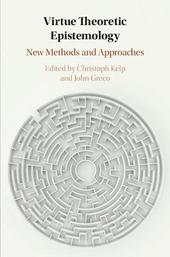
|
Virtue Theoretic Epistemology: New Methods and Approaches
Paperback / softback
Main Details
Description
Virtue epistemology is one of the most flourishing research programmes in contemporary epistemology. Its defining thesis is that properties of agents and groups are the primary focus of epistemic theorising. Within virtue epistemology two key strands can be distinguished: virtue reliabilism, which focuses on agent properties that are strongly truth-conducive, such as perceptual and inferential abilities of agents; and virtue responsibilism, which focuses on intellectual virtues in the sense of character traits of agents, such as open-mindedness and intellectual courage. This volume brings together ten new essays on virtue epistemology, with contributions to both of its key strands, written by leading authors in the field. It will advance the state of the art and provide readers with a valuable overview of what virtue epistemology has achieved.
Author Biography
Christoph Kelp is a Senior Lecturer in Philosophy at the University of Glasgow. He is the author of Good Thinking: A Knowledge First Virtue Epistemology (2018) and winner of the 2017 Young Epistemologist Prize. John Greco holds the McDevitt Chair in Philosophy at Georgetown University, Washington DC. His publications include Achieving Knowledge: A Virtue-theoretic Account of Epistemic Normativity (Cambridge, 2010) and The Transmission of Knowledge (Cambridge, forthcoming).
Reviews'This estimable collection presents essays from many of the most influential authors working in virtue epistemology - an approach to epistemology that either focuses on agent-centered factors to analyze important epistemic concepts such as knowledge, justification, reliability, or warrant or sees virtue epistemology as a fruitful way to conceive of values specific to cognition, such as open-mindedness or bias.' N. D. Smith, Choice
|